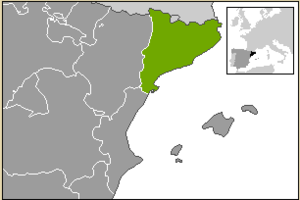Battle of Ibera
| date | 215 BC Chr. |
|---|---|
| place | near Tortosa in Catalonia in today's Spain |
| output | roman victory |
| Parties to the conflict | |
|---|---|
| Commander | |
| Troop strength | |
| 30,000 legionaries 3,000 riders |
approx. 25,000 men 4,000 riders 20 elephants |
| losses | |
|
high |
unknown |
Saguntum - Lilybaeum II - Rhone - Ticinus - Trebia - Cissa - Lake Trasimeno - Ager Falernus - Geronium - Cannae - Nola I - Nola II - Ibera - Cornus - Nola III - Beneventum I - Syracuse - Tarentum I - Capua I - Beneventum II - Silarus - Herdonia I - Upper Baetis - Capua II - Herdonia II - Numistro - Asculum - Tarentum II - New Carthage - Baecula - Grumentum - Metaurus - Ilipa - Crotona - Large fields - Cirta - Zama
The Battle of Ibera , also known as the Battle of Tortosa , was a skirmish between the Romans and the Carthaginians in the Second Punic War .
prehistory
While the main course of the Second Punic War took place in Italy with Hannibal , Hasdrubal , a brother of Hannibal, was tasked with defending the Carthaginian colonies on the Iberian Peninsula from attacks by the Roman legions. The Roman generals Gnaeus Cornelius Scipio Calvus and Publius Cornelius Scipio marched in 218 BC. BC with 30,000 legionaries to Spain. The Carthaginian main military base was in New Carthage, and the Romans provoked an attack on Hasdrubal by crossing the Ebro River . This had already led to the Battle of the Ebro. The Romans had won this, and Hasdrubal desperately needed a victory to secure his brother Hannibal's support in Italy. The Carthaginians therefore attacked in the spring of 215 BC. The city of Tortosa occupied by Cornelius Scipio .
course
The battle was fought in the fields in front of the city. The Carthaginians marched on in a broad front, with the Iberian infantry in the middle and horsemen and elephants on the flanks. When the Roman legionaries attacked, they were initially able to push back the core part of the enemy army, now the Carthaginian horsemen could fall in the sides of the Romans, which briefly turned the victory sheet. Because of the uneven terrain, the war elephants could not be used; they would probably have harmed our own troops more than the enemy. The Scipions now attacked with the horsemen, which prevented Hasdrubal from enclosing the Roman soldiers as at Cannae . This enabled the legions to regroup and launch a joint attack against the lightly armed Iberian foot troops. The Carthaginians panic, which is why many fled. Hasdrubal saw the battle as lost and withdrew with the riders.
consequences
Despite the victory, the Romans suffered very high losses, but the Carthaginians were probably no less. After this defeat of the Carthaginians, northern Spain remained in Roman hands. Hasdrubal was embarrassed in front of his own people for lacking the strategic skill of his brother. Carthage's hatred of these two Roman generals increased, which ultimately led to the skirmishes on the Upper Baetis , in which both were killed.
literature
- Peter Connolly : Hannibal, and the Enemies of Rome , ISBN 3-7886-0182-5
